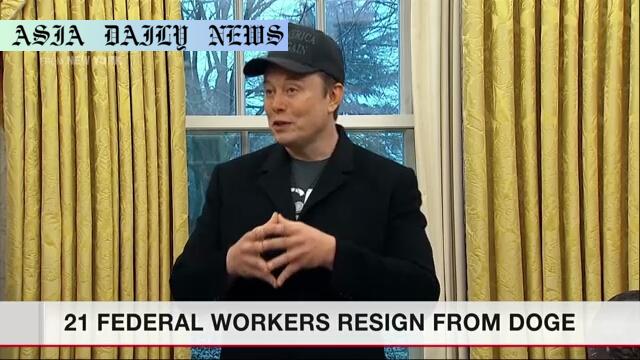DOGE Resignations: 21 federal staff protest Musk’s tech cuts.
DOGE Resignations: 21 federal workers step down due to job cuts.
Musk accused of firing experts, mishandling sensitive data.
The staffers claim DOGE is failing its modernization goals.

21 Federal Workers Resign from DOGE
The Department of Government Efficiency (DOGE), headed by entrepreneur Elon Musk, has witnessed the resignation of 21 federal workers. This event has sparked a wave of media attention, as it appears to be a direct protest against Musk’s controversial job-cutting agenda within the department. The resignations include engineers and data scientists, who argue that DOGE’s policies contradict the organization’s stated goal of modernizing federal technology systems to enhance efficiency and productivity.
Reasons Behind the Sudden Departures
According to a letter addressed to the White House Chief of Staff Susan Wiles, these employees cited several concerns ranging from the firing of skilled technical experts to the mishandling of sensitive data and the disruption of critical systems. These actions, they claim, are undermining DOGE’s mission to innovate and streamline government operations.
Musk’s Response to Resignations
Amidst criticisms, Musk took to social media to dismiss the allegations made by the resigning staff. He referred to Associated Press’ report on the issue as “fake news” and argued that the individuals who resigned were simply political holdovers who would have been terminated otherwise. Musk’s response, however, has only fueled further debate regarding his decision-making strategies and leadership tactics within the federal space.
A Historic Shift in US Federal Technology
DOGE was once recognized for its excellence under the umbrella of the United States Digital Service. The resignation of 21 highly skilled individuals has now raised questions about DOGE’s current standing and its roadmap for achieving technological efficiency. Critics argue that Musk’s job-cutting measures may result in the erosion of expertise within the federal workforce, which could disrupt critical national operations.
Long-Term Implications for Federal Efficiency
The resignation event highlights a broader conversation about balancing innovation and workforce stability in federal departments. Reducing costs and modernizing technology are undoubtedly necessary, but doing so at the expense of talented professionals can lead to inefficiencies and reduced morale. The outcomes of this event may influence future policies on technological integration and management within various US governmental agencies.
Commentary
Examining the Leadership Challenges
Leadership, particularly within public service, requires balancing innovation with stability. The recent resignations at DOGE bring to light the potential consequences of prioritizing cost-cutting over retaining skilled professionals. Elon Musk’s decision to dismiss expert staff and make sweeping changes may align with his past business strategies in the private sector, but its suitability for federal government operations remains deeply questionable.
The Role of Skilled Professionals in Innovation
Skilled experts like data scientists and engineers are the backbone of any technological transformation. Their sudden departure from DOGE is troubling, as their expertise is critical for implementing any meaningful modernization strategy. Furthermore, their claims regarding data mishandling and broken systems undermine public trust in DOGE’s ability to deliver on its efficiency promises.
Balancing Ambition with Pragmatism
Elon Musk is known for his ambitious endeavors in the tech and transportation industries, but government operations present entirely different challenges. While modernization and cost-cutting are essential, public institutions also demand transparency, fairness, and inclusivity. Ignoring these values for the sake of disruptive changes could jeopardize long-term stability.
A Lesson for Policymakers
This incident serves as a cautionary tale for policymakers and future agency leaders. Job cuts and reforms must be implemented with sensitivity to their impact on personnel and operations. Federal institutions, given their critical functions, require careful and thoughtful management to ensure both innovation and continuity.


